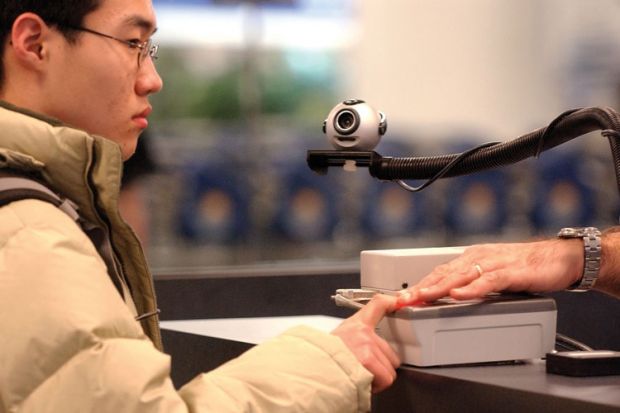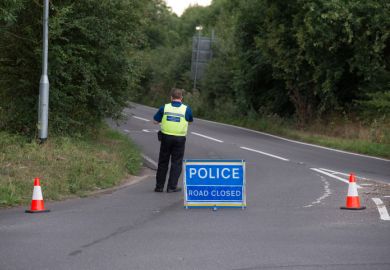Source: Getty
Where’s the trust? NUS criticises ‘incredibly unwelcoming’ measures
Universities are fingerprinting international students to check they are attending lectures, but not their UK counterparts, it has emerged.
The universities of Sunderland and Ulster have installed biometric monitoring systems on satellite campuses not used by British students, a move condemned by the National Union of Students.
Earlier this month, Sunderland brought in fingerprint-scanning devices for lectures on its London campus, replacing traditional paper registers. Ruth Davison, student relations and compliance manager at Sunderland, said the system had been installed because the site was “entirely international” and the Home Office required that all attendance be monitored.
Under a swipe pass system, students could sign each other in and passes could even be lost, she said. And time taken signing a physical register during lectures “has a huge impact on teaching and learning”.
The fingerprint data would be destroyed after students left the university, Ms Davison added. She also said that the students were “really comfortable” about fingerprinting and the London campus’ student council was happy with the system.
But Carl Taylor, president of Sunderland’s students’ union, said that as far as he was aware, the main union had not been informed.
He said he needed more information, but his “initial instinct” was that international students would see this as a “limitation of freedom”.
Ms Davison said that Sunderland had decided to consult only the students affected by the system.
Ulster introduced fingerprint scanners to its London and Birmingham campuses in January. A university spokesman said it had done so to comply with the government’s attendance monitoring requirements.
Daniel Stevens, international students’ officer at the NUS, attacked the systems as “incredibly unwelcoming” measures that appear to “unfairly target one group”.
He added: “It is appalling that certain institutions have required physical checks of any quantity and have discriminated against international students when implementing monitoring procedures.”
There has been confusion over what checks are necessary to make sure overseas students are in the UK to study rather than work. In February, the UK Border Agency, which was subsequently scrapped, clarified that universities “do not necessarily need to consider…physical checks” such as fingerprinting, nor do overseas students require more regular checks than their domestic peers.
Last year, Newcastle University considered introducing biometric checks but decided against them after a student union vote.
Register to continue
Why register?
- Registration is free and only takes a moment
- Once registered, you can read 3 articles a month
- Sign up for our newsletter
Subscribe
Or subscribe for unlimited access to:
- Unlimited access to news, views, insights & reviews
- Digital editions
- Digital access to THE’s university and college rankings analysis
Already registered or a current subscriber? Login




